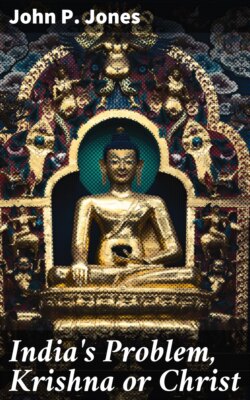Читать книгу India's Problem, Krishna or Christ - John P. Jones - Страница 24
На сайте Литреса книга снята с продажи.
6. The Credentials of the Two Faiths.
ОглавлениеTable of Contents
Each has its Scriptures in which are found its original teachings including a declaration of its source and message to man. Beyond this general statement very little can be predicated of these two in common. [pg 104] The theories of their inspiration are dissimilar. In the Bible there is no theory of inspiration taught. Its testimony to its own divine origin is indirect rather than direct. And yet the evidence, both internal and external, that the Bible was written by men under Divine guidance and inspiration is unmistakable and convincing. Whether we have regard to its prophetic utterances, its record of miracles, its plan of salvation, its delineation of the incomparable life and character of Jesus Christ; or whether we behold its marvellous power among men of all classes and of all countries and tongues—all that pertain to it point unmistakably to its divine origin.
Nor can any one fail to appreciate the beauty and sublimity of some of the Vedic hymns of the Hindus or the profound depth of the philosophic reach of the Upanishads, those sublime “guesses at truth,” or the great excellence of the Bhagavad-Gita which is the gem of all Hindu literature. And yet the puerilities of many and the obscenity of others of the Vedic songs and prayers are well-known. So are the strange vagaries and the rambling character of many parts of the Upanishads. And as for the Bhagavad-Gita it is simply a dialogue whose gist is the argument of Krishna—“the Supreme God”—to urge the tender-hearted and the conscience-smitten Arjuna to slay his relatives in war. Its argument is that no evil which one man may do to another is of any moment, since he cannot touch his soul which is eternal and beyond the reach of any human power! In the destiny of a soul what can the destruction of one of its bodies signify? This is an argument which is subversive of morality and of social order.
[pg 105]
When one leaves these earlier scriptures of Brahmanism and takes up the later productions—the Puranas and Tantras—he comes into a very different atmosphere, most of which is morally pestilential and spiritually degrading. The ascription of divine inspiration and special heavenly guidance in the production of such literature is nought else but blasphemy. To pass over from the study of the Bible, with its transcendent beauty, its perfect ethics, its heavenly spirit, its Divine Saviour and way of salvation, to the Scriptures of India, especially the more recent parts, is to exchange the pure air of heaven for the charnel house.
The “divine brevity” of the Bible is one of its most striking features. Few things could impress one with the heavenly source of this Book more markedly than its wonderful omissions.
How very different when we examine the countless tomes of the sacred literature of India! If the salvation of a soul depended upon the reading of even a hundredth part of these, who then could be saved? Their very multiplicity and their voluminous character debar any man, however learned, from an acquaintance with more than a small fraction of them. Moreover, among learned pandits of today the Smriti (traditions) are more frequently quoted as authority, and they wield a larger power over the life of the people, than the Sruti (revelation) itself.
In the Christian Bible we are permitted to see a progressive revelation. From age to age, and from page to page, we see new glimpses of truth and are attracted by the divine light whose illumination grows ever brighter from Genesis to Revelation. [pg 106] This is what we should have expected from a God-inspired book. We should have looked forward to a gradual transition from the starry midnight of the far-off past to the rising, in Christ, of the sun of righteousness with healing in His wings.
In Hindu literature this process is reversed. The surest, I may almost say, the only, evidence we have of divine guidance in the production of this literature is to be found among the earliest productions. There we see earnestness of purpose combined with heavenly aspiration and deep searching after truth. Subsequent to this we see the light vanishing and earnestness giving place to triviality of thought, to the ravings of superstition, to the inanities of ceremonialism and to the laws of social and religious bondage. All this progress downward is in direct ratio to our distance from Vedic times.
What could be more conclusive proof of the human source and direction of these prolific writings? Educated Hindus are sensible of this fact. They constantly hark back to the Vedas, to the Upanishads and to the Bhagavad-Gita, conscious of the fact that these represent the high water-mark of their faith and literature.
